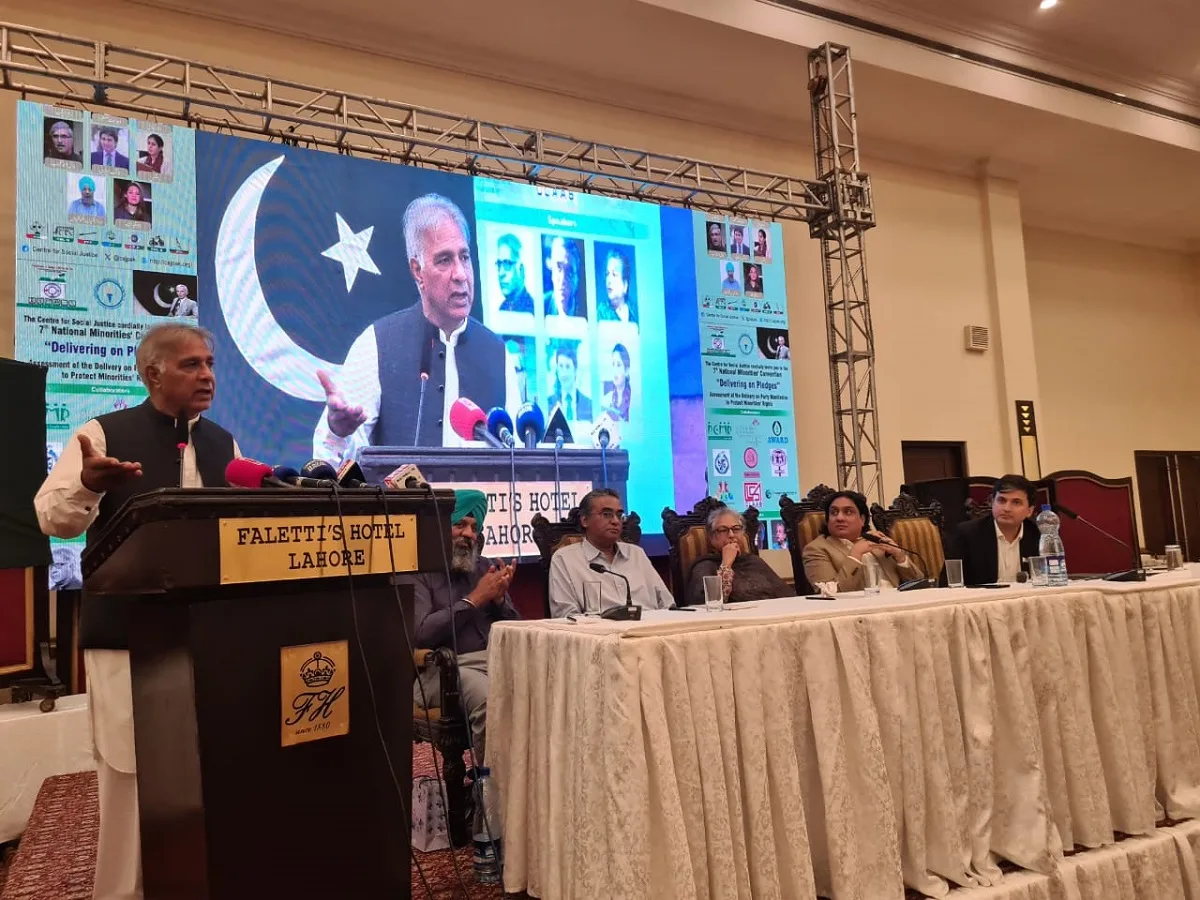LAHORE, Pakistan: Keeping its tradition of observing National Minorities’ Day annually, the Centre for Social Justice (CSJ) organized a 7th convention urging the political parties to Deliver on their Pledges made in the party manifestos to the minorities’ rights.
Hina Jillani, Peter Jacob, Wajahat Masood, Benazir Shah, Saqib Jillani, Veengas, Dr. Kalyan Singh Kalyan,, Yaqoob Khan Bangash and Suneel Malik were among the speakers. Whereas, Barrister Aamir Hassan (PPP), Ishtiaq Gohar (PML-Q) and Azhar Iqbal (JI) presented their parties’ policies regarding minorities’ rights.
Speaking on the occasion, Peter Jacob, executive director CSJ said that Quaid-e-Azam’s speech of 11 August 1947, the fourteen Points of Jinnah (1929), the Lahore Resolution (1940), and the Liaquat Nehru Pact (1950) are documents of the utmost importance as they contribute to addressing deprivations, ensuring equality of rights and establishing a just system.
He added that regrettably that the national assembly has passed a National Commission for Minorites Bill, 2023 without addressing its gaps, the onus is on the Senate to introduce amendments in the Bill to make the prospective minority rights body truly functional, and effective, independent, autonomous, and resourceful minority rights institution.
Hina Jillani Advocate said that Pakistan came into being for the protection of minorities’ rights, and issues faced by minorities need to be addressed by the state and government. She added that regressive policies are being framed to appease the violent forces and mindset that inculcate hatred among citizens on the basis of their identity. The religious content in all compulsory subjects sometimes becomes hurtful for children, particularly the believers of religions other than Islam, which needs to be reviewed.
Wajahat Masood, Chairperson CSJ said that the political parties need to review their actions, as the laws introduced in haste under the influence of fundamental groups are difficult to be withdrawn.
He added that the speech of Jinnah delivered on 11 August 1947 outlines the principles of tolerance and equality, however, objective resolution is contrary to what Quaid aimed for. It is a time that the state of Pakistan ought to introduce measures to ensure the equality of citizenship and rights for all, and demonstrate the neutrality of the state by removing the policy of preference on the basis of religion.
Barrister Aamir Hassan, a representative of the Pakistan Peoples Party said that the laws must not be inspired by religion to make the state affairs and religion separate as guaranteed by Jinnah in his speech on 11 August 1947.
He said that the law to amend section 298-A passed by parliament is problematic, as it is likely to be misused to make blasphemy accusations.
Benazir Shah said that regrettably, political parties lack an understanding of human rights issues, and they seem to be non-serious about addressing the issues that minorities face. She added that textbooks developed under single national curriculum of subjects: English, Urdu, and Social Science carry Islamic content, which should not be taught to religious minorities as guaranteed in Article 22(1) of the constitution of Pakistan.
She further said that political parties must not surrender their power to those forces which use religion for their political gains, and prevent progressive policy actions.
A journalist and activist, Veengas said that the forced conversions and child marriages of minority girls are a sad reality, however, unfortunately, successive governments have failed to introduce preventive legislation to address the phenomenon of forced conversions.
She added that the minor girls’ dreams matter and their spirits should not be murdered by forced conversion and underage marriage, so their rights need to be protected by the state.
Saqib Jillani Advocate called upon the governments at the Federal and Provincial levels, to pay comprehensive and urgent attention to the challenges faced by the minority communities (e.g. forced conversion, freedom of belief and freedom of study their own religion) and ensure implementation of Jilani judgment in letter and spirit, the judgment of the Supreme Court of Pakistan delivered on 19 June 2014.
Dr. Yaqoob Khan Bangash said that acts of discrimination, prejudice, and violence on different grounds are the reality of Pakistan, the political parties must consider introducing laws and policies that contribute to bringing about positive change in the mindset of people in a society.
Professor Sardar Kalyan Singh Kalyan said, the curriculum should focus on promoting inclusion, diversity and interaction between majority and minority students to curb religious intolerance. The school curricula and textbooks should focus on promoting inclusion, diversity, critical thinking, and learning outcomes.
Moreover, minorities should have access to suitable alternatives to compulsory Islamic education.
Suneel Malik presented the findings of the manifest assessment report “Promises to Keep & Miles to Go” regarding the assessment of the Delivery of the Pledges about Minorities’ Rights in Elections Manifestos.
He added that the political parties must not forget their commitments to the electorate, instead, they must focus on actions to implement the pledges they make in the election manifesto to improve the human rights situation in general, and religious freedom and minorities rights in particular.
Azhar Iqbal, a representative of the Jamaat-e-Islami said that the political parties need to prioritize the protection of minorities’ rights, and make efforts to enhance social cohesion in the society.
Ishtiaq Gohar, a representative of the Pakistan Muslim League (Q) said that forced faith conversion is against Islamic traditions, so is unacceptable. He added that the political parties must fulfill their promise, and take effective measures to address human rights issues affecting marginalized groups.
The convention brought a cross sections representation from civil society and political parties.
Pressing issues such as forced conversion, establishing the National Commission for Minorities, compliance of Judgment regarding minorities’ rights, and affirmative action for religious minorities, were discussed.
Two documentary films were shown at the convention. One on the importance/ relevance of National Minorities day and the second film “Humsaya” (Neighbour)”, a CSJ’s production that own a Best Short Documentary on Human Rights award at the prestigious #Venice Intercultural Film Festival (VIFF) in June 2023.
